Imperial measures
Documentary reveals how emperor’s actions brought disaster to Rome

Songs of Praise goes back to school

Documentary reveals how emperor’s actions brought disaster to Rome

Songs of Praise goes back to school
The Salvation Army is a Christian church and registered charity seeking to share the good news of Jesus and nurture committed followers of him. We also serve people without discrimination, care for creation and seek justice and reconciliation. We offer practical support and services in more than 700 centres throughout the UK. Go to salvationarmy.org.uk/find-a-church to find your nearest centre.
The Salvation Army first published a newspaper called the War Cry in London in December 1879, and we have continued to appear every week since then. Our name refers to our battle for people’s hearts and souls as we promote the positive impact of the Christian faith and The Salvation Army’s fight for greater social justice.
Editor: Andrew Stone, Major
Managing Editor: Philip Halcrow
Staff Writer: Emily Bright
Staff Writer: Claire Brine
Staff Writer: Ewan Hall
Editorial Assistant: Linda McTurk
Graphic Designer: Mark Knight
Graphic Designer: Natalie Adkins
Email: warcry@salvationarmy.org.uk
The Salvation Army
United Kingdom and Ireland Territory
1 Champion Park London SE5 8FJ
Tel: 0845 634 0101
Subscriptions: 01933 445445 (option 1, option 1) or email: subscriptions@satcol.org
Founders: Catherine and William Booth
International leaders: General Lyndon Buckingham and Commissioner Bronwyn Buckingham Territorial leaders: Commissioners Jenine and Paul Main
Editor-in-Chief: Major Julian Watchorn
Ireland Territory ISSN 0043-0226
The Salvation Army Trust is a registered charity. The charity number in England, Wales and Northern Ireland is 214779, in Scotland SC009359 and in the Republic of Ireland CHY6399.
One of the most memorable moments from Glastonbury this summer was when James B Partridge led thousands of festivalgoers in singing ‘Give Me Oil In My Lamp’. The song was part of a set James staged which transported his audience back to their school assembly days.
‘I can’t remember what I did yesterday,’ one festivalgoer told the BBC, ‘but I can remember the words of all those songs.’
‘I think it just shows the power of singing,’ Songs of Praise series producer David Waters tells us in an interview this week. ‘These lyrics stick in your head because you sang them – in some schools – every day. They’re also just brilliantly written. They’re catchy. There’s a lot of repetition. And they’re jolly.’
This Sunday (23 November), Songs of Praise is broadcasting The Big School Assembly Singalong, which reveals the nation’s 20 favourite songs from school days gone by. David explains that filming the programme was a wonderful experience.
‘There was a great joy in the room, as there’s an amazing power in those hymns that you remember from childhood,’ he says.
Pam Rhodes, who has presented Songs of Praise for 38 years, agrees.
‘Many will have heard about the stories of the Bible through hymns,’ she tells us in the article. ‘Especially with the hymns that had actions to them – people really love them and just remember them.’
However, for Pam, the songs and hymns that regularly feature in the programme – and in church services up and down the country – have another powerful aspect to them.
‘Hymns are also a rich resource of wisdom through the years and, for many people,’ she says, ‘they can bring to mind particular people and occasions, whether they were sad, challenging or happy.’
Many people associate hymns with key moments in their lives because they received strength, comfort and hope through their Christian faith. They know that, whatever they may be going through, God is with them. Surely that’s something to remember and sing about.
When you’ve read the War Cry, why not pass it on ➔ ➔ ➔


Printed by CKN Print, Northampton, on sustainably sourced paper
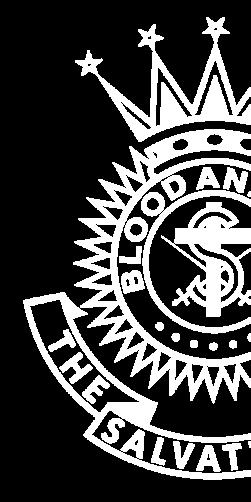




General Stilicho (Roberto Davide, centre) is taken away to be executed
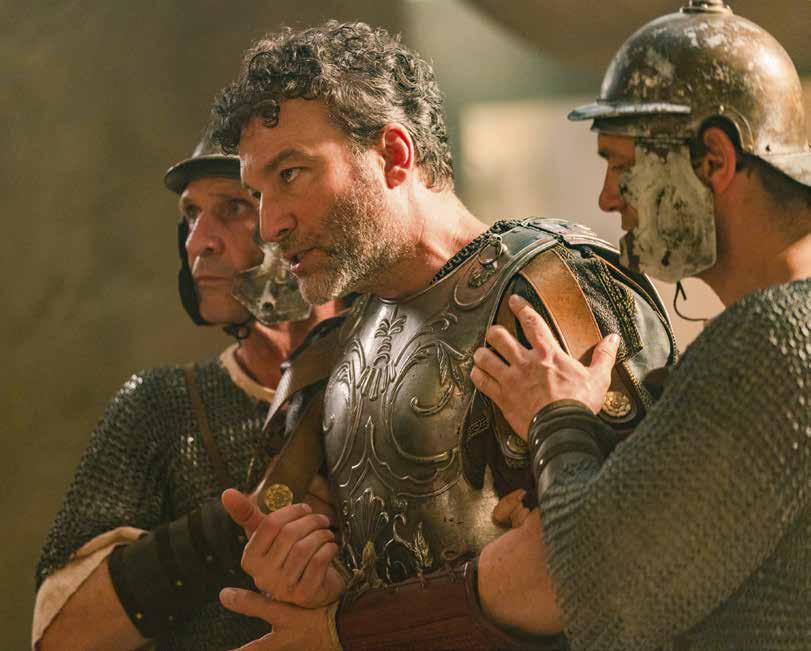
TV preview: Civilisations: Rise and Fall Mondays BBC2 and iPlayer
By Claire Brine
It’s410AD. The ancient city of Rome is under attack. And the Roman Empire – the mightiest empire on earth – is heading for collapse. No one could see it coming, say historians. So where did it all go wrong? The story behind the Sack of Rome is revealed in BBC2’s Civilisations: Rise and Fall
The series begins in 395AD, when the young Honorius inherits a vast but fragile empire. With no leadership experience, he’s out of his depth. For centuries, the Roman Empire had been a thriving territory encompassing a multitude of cultures and languages – but the new ruler is struggling to keep the people together. Decisions by previous leaders have resulted in cracks in the system: economic inequality, racial prejudice and corruption among the elite.
Guiding Honorius as he tries to establish stability is General Stilicho, the commander of Rome’s western army. He tries to construct a new image for the emperor – one of power and authority. But ill-feeling is brewing among the Visigoths – a group who entered the empire in 376AD, yet continued to be viewed as savages.
Led by experienced soldier Alaric, the Visigoths gain strength. And, fed up of mistreatment from Roman officials, they mount a rebellion. Honorius and Stilicho feel threatened.
Overcome with paranoia, Honorius orders for Stilicho’s execution, fearing he has united with Alaric’s army. It’s a killing that history books will call ‘a catastrophic error’. The general’s death shocks the city.
With Stilicho out of the picture, there is nothing to stop Alaric and his supporters from capturing Rome. Violence erupts in the city’s streets. Countless people are killed. A retreating Honorius is seen by his subjects as foolish. It’s the beginning of the end for the western Roman Empire.
As viewers get to grips with the intricacies behind the rise and spectacular fall of an ancient civilisation, the programme raises one important question for a modern world: what can we learn from the past?
Perhaps, when we look back on times gone by, we feel that nothing has changed. There are global leaders who still mishandle the power entrusted to them. Racial prejudice is rife. The rich
seem to get richer while the poor suffer and starve.
When we consider the problems facing our civilisation today – poverty, war, a climate crisis – it’s easy to feel that the whole planet is in a mess. But when followers of Jesus voiced their despair about the state of the world, he responded with a message of hope. He told them that their heavenly Father, God, was ultimately powerful. That his Kingdom was built on love, goodness and truth. And that it was open to everyone willing to follow him.
Living God’s way, said Jesus, is about loving others, not just ourselves. It means we forgive at every opportunity. It requires us to stop judging others and hoarding our wealth. It means we help everyone who needs it.
‘The Kingdom of God is within you,’ he said (Luke 17:21 Good News Bible). In other words, if we want to change the world, it starts with us.
It’s a big responsibility. But when we allow God’s presence to reign in our hearts, we can create a world filled with the kind of love, joy and peace that never fail – and will never, ever end.
Brine gives her take on a story that has caught the attention of War
Many honesty boxes are ‘flourishing’, according to a report on the BBC News website.
The article pointed out that, with cash use in decline, honesty boxes, located in lay-bys which offer items such as eggs or apples for a small donation, could be expected to disappear. But small traders who use honesty boxes and promote them on social media have been asking people to make their payments online via QR codes. It’s a decision that appears to be paying off. Some customers are even ‘making a special journey’ to buy from the boxes.
The article went on to explain how Annabelle Cox, founder of Dunk Cookies, installed an honesty box earlier this year. She revealed that it brought in enough money for her to afford her bakery’s rent at a nearby industrial estate. She also said that almost all her customers are honest in paying for their goods.
Photographer Kathryn Martin was another fan of honesty boxes. The article highlighted how she spent a couple of years taking photos of the boxes that she encountered on her travels in the south of England.
She wrote on her website: ‘You accept that there will always be a few who won’t pay, but on the whole most people are honest.’ Kathryn concluded that ‘honesty is indeed the best policy’.
I’m inclined to agree. The importance of being an honest person is something I learnt at a young age and, as a Christian, I can see that the Bible highlights the value of honesty time after time.
In the Book of Proverbs, it says: ‘If you are good, you are guided by honesty,’ (11:3 Good News Bible); ‘An honest answer is a sign of true friendship’ (24:26); and: ‘Better to be poor and honest than rich and dishonest’ (28:6).
The point is: honesty matters to God. It’s how he wants us to live.
Being honest isn’t always easy. When life gets messy, dishonesty can be tempting. But I’m encouraged to know that God will support those who strive to live their lives in an honest way.
Proverbs offers us this reassurance: ‘He provides help and protection for those who are righteous and honest’ (2:7).
That’s a statement I have found to be true – honestly.
When a group of public figures shared in The Sunday Times the books that ‘changed their lives’, novelist Katherine Rundell selected The Chronicles of Narnia by CS Lewis.
The series of children’s stories – which explore aspects of the Christian faith and humankind’s battle between good and evil –follow a group of children as they visit a fantasy world called Narnia and encounter its sovereign, a lion called Aslan.
Katherine, whose book Impossible Creatures was named Waterstones Book of the Year in 2023, said: ‘I fell in love with The Chronicles of Narnia as a child. They offered a world to return to over and over; they were witty and serious, domestic and vast, archetypal and idiosyncratic all at once. I loved both the huge bold sweep of it and the scholarly detail: for instance, Aslan is Turkish for lion, and Lewis pronounced it “Asslan”, because áss is Norse for god.
‘I remember wanting to run home from school to finish reading Prince Caspian: the book had a physical pull on me.’
Last month marked 75 years since The Lion, the Witch and the Wardrobe by CS Lewis was first published.
An artist’s impression of the wall



Construction has now begun on the Eternal Wall of Answered Prayer – a Christian landmark to be erected in Coleshill near Birmingham –after it reached its £40 million fundraising target.
The monument will be shaped into a Möbius strip – an infinite loop – to symbolise how God is always listening to and answering prayer. The structure will comprise one million bricks, each representing a story of answered prayer, and stand at 51.5 metres high, more than twice the size of the Angel of the North.
The Eternal Wall is expected to open to the public in 2028, with the hope of attracting up to 250,000 visitors a year.
Richard Gamble, the chief executive of the project, said: ‘I am delighted we are creating a monument that will share a million stories of hope and that people will be able to discover Jesus, who listens to and answers prayer. This is the moment to build a landmark of hope … a lasting testimony to the power of prayer.’
nToyshop chain The Entertainer and The Salvation Army are running their annual Big Toy Appeal to give Christmas presents to underprivileged children.
The retailer encourages customers to donate an extra item when they buy in-store and online, and it matches each donation with one of its own.
The toys are then distributed to struggling families by the church and charity, ensuring that children who might otherwise go without a gift will have something to unwrap on Christmas Day.
Since 2018, the Big Toy Appeal has provided more than 134,000 gifts. This year’s appeal runs until 29 November, with the delivery of toys to Salvation Army churches expected in early December.
For more information visit thetoyshop.com/big-toy-appeal

Policy officer JEZ BUSHNELL explains why The Salvation Army is appealing to the UK government to adopt a life-saving drug
Interview by Ewan Hall

Without urgent action, 20,000 lives could be lost to opioids in the UK over the next five years, according to a recent report from The Salvation Army. These drugs, says the church and charity, already account for a high proportion of drug-related deaths. Additionally, the rise of synthetic opioids, which are up to 50 times stronger than heroin, has intensified the crisis. Currently in the UK, 10 people die every day as a result of drug poisoning involving opioids.
However, many of those potential deaths could be avoided if a life-saving medication called naloxone was more readily available. That’s why The Salvation Army is appealing to the UK government to support its wider use.
Rooted in biblical principles and a steadfast commitment to doing good wherever possible, The Salvation Army has supported people living with addiction for more than 150 years.
‘There’s often a perception that we
offer tea, a brass band and a chat,’ says Jez Bushnell, the homelessness and addictions policy lead for The Salvation Army’s public affairs unit. ‘But our services are so much more than that. We provide support for addiction, mental health, NHS liaison, employment, accommodation, outreach – the whole picture.
‘And that depth of work means we’re not talking into issues we don’t understand. We’ve got the tools, experience and the knowledge. That’s especially true when it comes to substance use. The Salvation Army has been incredibly concerned by the rise in drug-related deaths over the past decade – particularly involving opioids. National figures show thousands of people across the UK are losing their lives, and that’s something we can’t ignore.
‘So, we know what we’re talking about when it comes to naloxone. It’s a safe, simple tool – but it’s also a lifeline. And
it’s one we believe should be in the hands of more people.’
Naloxone is a drug that can be administered in two ways – as a nasal spray or injection. The medicine restores breathing to someone who has overdosed on opioids. It is also effective with synthetic opioids.
‘Naloxone is the most obvious tool to use as it literally keeps people alive,’ Jez explains. ‘It gives someone the chance to continue and improve their life.
‘One of the most important factors people need to know about naloxone is that if you give it to someone who wasn’t having an opioid overdose, it wouldn’t do them any harm. But if someone has overdosed, it can keep them alive long enough for emergency services to arrive. It is life-saving.’
To help tackle the growing opioid crisis, The Salvation Army is engaging with parliament as part of a multi-year campaign to expand the use of naloxone.

The
Salvation Army is raising awareness of the drug naloxone
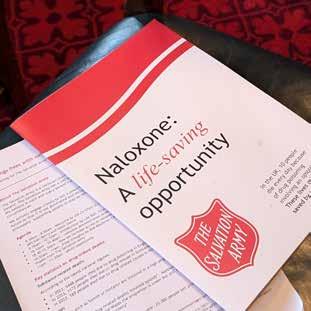
Its appeal to politicians outlines a series of urgent and practical steps necessary to save lives.
‘We want to see a national awareness campaign on naloxone – such as the one already commissioned in Scotland – so that more people understand what it is and how it saves lives,’ says Jez. ‘We’re also calling for naloxone to be made available in key public spaces, similar to defibrillators, with lock boxes accessible via 999 calls.
‘We believe everyone leaving prison should be offered naloxone to take home, as the risk of overdose is significantly higher post-release.
‘We’re also asking the government to enable more organisations to distribute naloxone. Until recently, only certain professionals – mostly within drug support services – could legally provide take-home naloxone. The law has now expanded to include more roles, like pharmacists and prison officers.
‘There are also plans for a system where any organisation, including charities like ours, can apply to distribute naloxone if they meet specific criteria, such as training standards. This change is vital to widen access and save lives.
The number of lives lost to drug use is
‘Additionally, we want every local authority to have a bespoke naloxone policy, which would include staff training, supply management and clear procedures for working with vulnerable populations. Other UK nations have had centrally funded naloxone programmes to ensure consistent supply, but England is falling behind. These are practical, achievable steps and, if
implemented, we believe they would lead to fewer overdose deaths.’
Crucial to The Salvation Army’s campaign is raising the public’s awareness of naloxone and of the realities of drug use.
‘Our ethos is about breaking taboos and myths around drug use,’ says Jez. ‘People say it’s a lifestyle choice, but we know from our services that it’s often rooted in deep trauma. There’s still so much stigma attached to it.
‘Naloxone is part of changing that. It doesn’t require a medical degree, and it can save lives. I learnt to use it in half an hour. Overdose can happen anywhere, and awareness shouldn’t be limited to professionals.
‘The number of lives lost to drug use is both terrifying and heartbreaking – especially when we know there’s a simple, life-saving solution like naloxone. Expanding access isn’t just sensible; it’s a moral duty.’

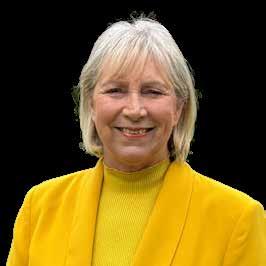

Ahead of Songs of Praise ’s The Big School Assembly Singalong, series producer David Waters and long-time presenter Pam Rhodes explain what lies behind the enduring appeal of primary school hymns
Feature by Emily Bright
‘We did Christmas on the Friday night at Victoria Hall in Bolton, took all the Christmas trees down,’ recalls Songs of Praise series producer David Waters. ‘And then on the Saturday, we turned the hall – which is a working Methodist church – into a big school. We had blackboards, paper aeroplanes and exercise books. Aled Jones had a head boy badge on. We recorded The Big School Assembly Singalong in the evening.’
After a public vote from a shortlist of 50 hymns and songs, the Songs of Praise episode reveals the nation’s 20 favourite school assembly hymns. Eight of the songs were performed by a choir, an onstage band, and an audience of 500 voices. The programme will be broadcast on BBC1 on Sunday (23 November) at 1.15pm and will be available on iPlayer for a year.
Hosted by the Rev Kate Bottley and Aled Jones, The Big School Assembly Singalong features special guest
James B Partridge, a music teacher perhaps best known for playing sets of ‘primary school bangers’ to packed-out audiences at the Glastonbury Festival. He first went viral online during lockdown after posting his performances of school assembly songs on TikTok.
The idea for the Songs of Praise programme had been on David’s mind for a long time.
‘It had been living in my head for about two and a half years,’ he says. ‘Our team realised that there was something happening with those old school hymns that just triggered this incredible response.
‘I’d clocked it when James B Partridge started to go viral and had hit this amazing vein. And I was just sitting there thinking: “This is our territory. We’ve been doing this for 60 years.”’
But even before James had appeared on the scene, David spotted a huge social media response to a picture of Come and Praise – a school assembly hymn book,

which was published by the BBC back in 1978 that remained a staple in many primary schools for the next two decades. People’s reactions to the post encouraged him to suggest a special Songs of Praise episode all about assembly hymns.
David was right about the level of interest – up to 45,000 votes were cast by members of the public for their favourite school assembly hymn.
He remembers that whittling down the contenders for the public vote had made for a fun day at the office.
‘We had a wonderful time choosing the 50 songs for our web page,’ he says. ‘We sat in a room and sang through about 100 hymns. It was one of those moments when the executive producer was like: “There are no other programmes where we’d be doing this.”’
The longlist unapologetically leant more towards the hymns sung by people who went to primary school in the 1970s, ’80s and ’90s, rather than those that older
generations would have used in their assemblies, which – says David – ‘we sing most weeks on Songs of Praise anyway’.
We wanted the vibe to be really playful and fun
‘Wechose hymns that had gone massive socially, like those James had taken to Glastonbury,’ he explains.
‘There were a few key hymn books that we turned to, which were designed for children, that included songs like “One More Step Along the World I Go” and “He’s Got the Whole World in his Hands”.
‘The list did skew to a more specific demographic, but there were still hymns like “Lord of All Hopefulness” and “All Things Bright and Beautiful” in there. It had a good mix, and I think most people agreed with the hymns that were voted in the top three.’
When the Songs of Praise team recorded the episode, says David, they wanted the ‘whole vibe to be really playful and fun’.
He adds: ‘We found with these hymns that there’s just such an accessibility to them. And a slightly different crowd –those who perhaps don’t usually come to Songs of Praise recordings – were there.
‘There was a great joy in the room, as there’s an amazing power in those hymns that you remember from childhood. People also don’t always think those hymns are religious. You can sing them even if you’ve never set foot in a church. Kate Bottley said that the songs introduced the story of Jesus to multiple generations.
‘I think it just shows the power of singing. These lyrics stick in your head
Turn to page 10 f

From page 9
because you sang them – in some schools, every day. They’re also just brilliantly written. They’re catchy. There’s a lot of repetition. And they’re jolly.’
David thinks that the chief reason for the enduring appeal of school assembly hymns is nostalgia.
He explains: ‘So many of us in our 40s and 50s can’t remember what we did yesterday, but we can remember all the words to “Autumn Days”. So those songs have just got a great power.’
Songs of Praise presenter Pam Rhodes also believes that school assemblies –and their hymns – leave a lasting impact on people.
‘Many will have heard about the stories of the Bible through hymns,’ she says. ‘Especially with the hymns that had actions to them – people really love them and just remember them.
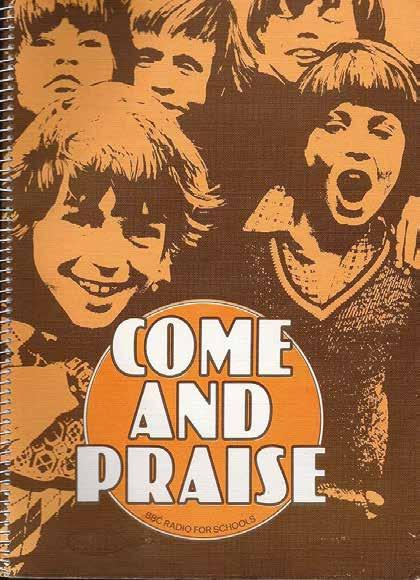
‘Music is a tremendously inclusive way to sing praise to God,’ she continues. ‘There are such wonderful worship songs around now with words that are really easy to sing and are straightforward in their meaning. People can sing with their eyes closed, and it comes straight from their heart.
‘Hymns are also a rich resource of wisdom through the years and, for many people, they can bring to mind particular people and occasions, whether they were sad, challenging or happy.’
Songs of Praise has now been on the UK airwaves for 64 years and Pam attributes the programme’s success partly to its worship.
‘I think people connect with the music, which has the words in subtitles,’ she says. ‘It’s a huge karaoke, isn’t it? One of the biggest and the best. And you just know that people are joining in and singing very accessible hymns.’
Yet the programme’s long-lasting popularity seems to defy a wider decline in religious programming among other public service broadcasters.
Behind the Screen, a report released by the University of Leeds in July this year, found that on many of the main channels, programmes on ‘religion and belief’ weren’t ‘readily available, prominent or discoverable’.
Messages of love are even more important now
Pam is certain of the value of Songs of Praise, and she believes that her view is shared.
‘The BBC, who put it out for all these years, is very committed,’ she says. ‘It realises that such programmes have set the tone of the personality of our country – how we look at right and wrong, caring for our neighbours, working with our communities and about love and forgiveness.
‘Christianity has informed the country we live in. Those messages of love, neighbourliness, forgiveness and tolerance are perhaps even more important now in a diverse society than they ever have been. I’d like to see more Christian programmes on television, and also more programmes about other faiths.’
In the same vein, David believes that religious literacy is important.
‘We need to understand people,’ he says. ‘The biggest form of conflict is ignorance. So I think it helps to

understand why people believe what they believe. And it’s so vital just to reflect real lives and real lived experience of faith. Broadcasting has an amazing gift for that.’
As a Christian, David sees his work on Songs of Praise as both a calling and an encouragement.
‘I find the music that we record so moving, and our team are so brilliant at finding stories. You see the best of people and faith in action.
‘I probably cry most weeks in work, because you’re listening to someone’s life being transformed or watching an amazing performance, and you think: “What a privilege to put this on telly!”
‘Through the programme, God has taught me to keep my mind open, because we’ve got a brief to reflect Christianity as best we can in the UK.
One week we’re seeing God working in a Pentecostal church, the next a Catholic one, and then God’s working through a soup kitchen. Even though we’re a niche programme, the variety is bonkers.’
Pam also finds her role as a presenter an encouragement to her own faith.
‘I’ve learnt so much from other people,’ she reflects. ‘I’m a lady with the questions, they share the answers. They share their experience with me and with everyone watching at home and it’s inspirational.
‘I don’t see how I could possibly hear, year after year – and I’ve been doing the programme for 38 years – all those hundreds of people that I’ve talked to and not recognise the presence of God, the power of prayer and what Christ means to us in our lives today.’
In recent years, David has noticed a greater hunger to explore Christianity, with a ‘significant upsurge’ in openness to faith, but also a ‘real quest’ to find out more.
‘A whole generation of footballers are talking about faith,’ he says. ‘Olympic athletes, pop stars like Stormzy and Raye – all these people are massively open about faith, whereas 20 years ago, people were like, “Don’t talk about God”. Or it was trendy to diss religion and be a new wave atheist. I think that has changed completely.
‘Because of that, I think it’s vitally important that we reflect different communities, beliefs and ways of life – religious or otherwise – just to help understanding. Broadcasting can help bring that.’
The War Cry invites readers to send in requests for prayer, including the first names of individuals and details of their circumstances, for publication. Send your Prayerlink requests to warcry@salvationarmy.org.uk or to War Cry, 1 Champion Park, London SE5 8FJ. Mark your correspondence ‘Confidential’.
There is no set formula to becoming a Christian, but many people have found saying this prayer to be a helpful first step to a relationship with God
Nigel Bovey gives chapter and verse on each book
The Gospel according to Matthew is primarily addressed to a Jewish readership. The author’s aim is to explain how Jesus is the fulfilment of the longed-for kingly Messiah. To do so, he uses many supportive Old Testament texts, sometimes along with the phrase ‘this was to fulfil’. He also portrays Jesus as making references to the leading patriarchs and prophets in Judaism. The genealogy in chapter 1 traces Jesus’ roots back to Judaism’s founding father, Abraham.
Matthew’s Gospel majors on what Jesus said. It covers three main areas: the practicalities of faith, parables and prophecy.
In the Sermon on the Mount, which begins with the Beatitudes (chapter 5) and includes the Lord’s Prayer (chapter 6), Jesus sets out the spiritual priorities for any would-be followers. A spiritual relationship, he says, is not only about belief in God but also includes right behaviour and attitudes towards other people. Jesus offers moral insight on personal relationships (5:21–48; 7:1–5 and 12), religious observance (6:1–18) and materialism (6:19–24).
Lord Jesus Christ,
I know that I have done things in my life that are wrong and I’m sorry.
Thank you that I can ask you for forgiveness because of the sacrifice you made when you died on the cross.

Please forgive me and help me to live a better life in the future as I learn how to love you and follow your way of living.
Thank you, Lord Jesus. If you’ve prayed this prayer, scan the QR code or contact us using the coupon on this page







The sermon also contains the first of Jesus’ many parables (7:24–27), which are simple stories set in the everyday that tell a spiritual truth.
Chapter 13 bursts with such stories. Jesus uses a sower, a mustard seed, hidden treasure, yeast, a priceless pearl and a fishing net to illustrate and explain his spiritual points.
In later parables, Jesus identifies those who will be eligible for a place in the Kingdom of Heaven. They are people considered by society to be at the bottom of the pile (20:1–16), those who repent (21:28–32) and those who are ready (21:33–44; 22:1–14; 25:1–30).
As well as predicting his own death and resurrection (17:22 and 23), Jesus prophesies about the end of the world. In a similar vein to the apocalyptic Old Testament prophets, he describes cataclysmic political and environmental conditions, tribulation for believers and astronomical disruption as precursors to his return (chapter 24), following which there will be the Last Judgement (25:31–46).
To enable those who put their faith in him to be ready to meet their Maker, Jesus submits to the ignominy of crucifixion (chapters 26 and 27) before the glory of his resurrection (chapter 28).




























































To receive basic reading about Christianity and information about The Salvation Army, complete this coupon and send it to
Cry 1 Champion Park London SE5 8FJ


















1 2 3 4 5 6
Name the American TV sitcom set in a Boston bar.
What is the name of the AI computer that malfunctions in the film 2001: A Space Odyssey?
Mont Blanc and Matterhorn are peaks located in which set of mountains in Europe?
Said and Done and Where We Belong were No 1 hit albums in the 90s by which music group?
What is the term for the process by which plants convert sunlight into energy?
What is the title of comedian Bob Mortimer’s new mystery book about a bathroom salesman named Matt?

Feature by Ewan Hall
Forsome, politics may seem little more than grown men and women shouting across a room while one person repeatedly calls for order. UK Parliament Week hopes to challenge that perception by educating people about the country’s political processes.
Starting on 24 November, the initiative is aimed at schools, youth groups and community organisations. Last year more than 2.4 million people took part.
Participants who sign up to the week this year will receive a digital resources kit to help plan activities and spark conversations around issues they care about. This year’s focus is on the UK parliament’s purpose, impact on our daily lives and how individuals can contribute to the democratic process.
As part of its educational mission, UK Parliament Week is also celebrating 10 years of the UK government and parliament e-petition website – a platform that allows the public to raise issues online that matter to them.
At 10,000 signatures on an e-petition, the government responds to the issue and at 100,000, it is likely to be debated in parliament.
One issue definitely being debated this week is the budget. With the speculation surrounding what the chancellor has in mind, many people are understandably anxious about how it will impact their lives.
The fear of the unknown is scary, whether we worry about our finances, relationships or even our health. Not knowing what comes next can be deeply unsettling. Christians, though, take solace in their belief that they do not have to face troubling times alone.
In the Bible, one writer reminded people of God’s comforting presence saying: ‘He will be with you; he will not leave you or abandon you. Do not be afraid or discouraged’ (Deuteronomy 31:8 Christian Standard Bible).
God’s promise to be with us can offer a steady reassurance. Regardless of what happens to us we do not have to face our days alone. If we vote to invite God into our lives, he will bring a sense of order to any chaos.
ACROSS
1. Dictatorial (5)
4. Tendon (5)
8. Perform (3)
9. Type of poetry (5)
10. Bequeath (5)
11. Pig (3)
12. Boast unpleasantly (5)
13. Stonework (7)
16. Flight of steps (6)
19. Scold (6)
23. Blow up (7)
26. Bring upon oneself (5)
28. Rodent (3)
29. Oval fruit (5)
30. Over (5)
31. Douse (3)
32. Swill (5)
33. Rash (5) DOWN
2. Braking system (5)
3. Sailor (7)
4. Mark of shame (6)
5. Requirements (5)
6. Broaden (5)

7. Disorderly (5)
9. Nigerian city (5)

14. Paddle (3)
15. Groove (3)
17. Tariff (3)
18. Unwell (3)
20. Monumental inscription (7)
21. Eagle’s nest (5)
22. Ridicule (6)
23. Black wood (5)
24. Before (5)
25. Sea (5)
27. Angry
Each solution starts on the coloured cell and reads clockwise round the number


System of stars 2. Slice of bacon
3. Female parent
4. Piece of jewellery fastened to clothing
5. Dipping dish 6. Colourless, odourless gas

Fill the grid so that every column, every row and every 3x3 box contains the digits 1 to 9
Look up, down, forwards, backwards and diagonally on the grid to find these hit singles of the 2010s



700ml full-fat milk
350g macaroni
50g butter, plus a little extra for greasing
50g plain flour 175g mature cheddar cheese
1tsp English mustard Salt and pepper
50g Parmesan cheese
50g coarse white breadcrumbs

4

Preheat the oven to 190C/Gas Mark 5.
Grease an ovenproof dish with butter.

Pour the milk into a small pan and heat to almost boiling. Remove the pan from the heat and set aside. Cook the macaroni until al dente, according to the packet instructions.
While the pasta is cooking, grate the cheeses and grease an ovenproof dish. To make a roux (which is flour and fat cooked together and then used to thicken sauces), melt the butter in large pan. When it starts to foam, add the flour and cook on a low heat for 1 minute, stirring constantly.
Once the pasta is cooked, drain using the colander, then place under the tap. Return to the pan and add a little water, and stir, to help prevent the pasta from sticking together.
To finish the sauce, slowly stir the warm milk into the roux until smooth.
Simmer for 3-4 minutes, stirring often until the sauce has thickened and has a coating consistency.
Remove the pan from the heat, then add the cheddar and mustard. Season with salt and pepper, if desired, then stir until the cheese has melted.
Mix the cheese sauce with the macaroni to coat it well, then tip into the prepared dish. Sprinkle the Parmesan cheese and breadcrumbs over the top and place in the oven.
Bake for about 15–20 minutes, until golden brown and bubbling. Garnish with fresh herbs and serve with a crispy salad.

Cooking oil
125g butter
125g brown sugar
110g caster sugar
1 egg
1tsp vanilla essence
225g selfraising flour
½ tsp salt
200g chocolate chips

Preheat the oven to 200C/Gas Mark 7. Grease a baking sheet with a little cooking oil.
Cream together the butter and sugar in a bowl. Beat the egg and the vanilla essence in a separate bowl, then add to the butter and sugar. Mix well.
Stir in the flour and salt, until a soft dough forms. Mix in the chocolate chips. Take a teaspoon of batter out one at a time and roll into a ball.
Evenly space out the dough balls on a baking sheet, then bake in the oven for 7-10 minutes. Allow the cookies to cool slightly, before serving.


Psalm 107:8 (Contemporary English Version)